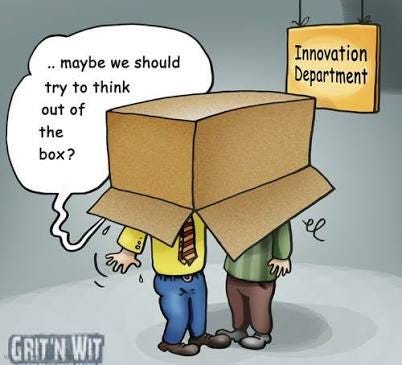Break the Box: Build an idea driven organization. Some years back, I stumbled on a story of how an excellent organisation that was the envy of competitors ran into troubled waters with one of its fast-moving products. It was a terrible moment for the company as the share price experienced a free fall; the reputation of the company was under water; investors lost confidence, and the government wielded the big hammer. The management team tried to solve the problem by every means they knew.
They spent so much time and resources and still got no solution. Finally, they gave up and sold out. Few days after, it seemed that the new owners had solved the issue. The former owners were baffled and shocked industry watchers. They launched a full-scale investigation that revealed what happened — a junior employee had a game-changing idea to resolve the problem but did not have the opportunity to be part of the brain in the game. Once, he summoned the courage and approached the former management team, but they did not have the patience to hear him out. As soon as the company was bought, he walked up to the new owners — they listened to him, and the rest was history.
“Treat employees like they make a difference and they will. — Jim Goodnight”
Suggestion Boxes: A great Invention?
I have always been thrilled to see suggestion boxes deployed in strategic places in organisations. It feels so good to know that decision-makers of organisations admit that they do not have the monopoly of knowledge and put out the “call for suggestions”.
In one craft of wood, glass, or metal, the employee, connects with the management and safely air his or her views anonymously especially in an atmosphere with the “shoot the messenger” mentality.
The power of the Box
Suggestion boxes became part of companies’ strategies after the world war II; it was a perfect strategy to harvest workers views on issues like product/service improvement, workplace safety, operational issues etc. The strategy is like opening boardroom sessions to everyone that works in the organisation including visitors! A functional suggestion box even presents better opportunities than an open invitation to boardroom sessions:
- Boardroom meetings hold once in a while, but Suggestion Boxes presents the opportunities round the clock. A janitor may have an idea while cleaning the office and drop the idea without waiting for protocols or approvals.
- Inviting all to the boardroom may not achieve the desired result because of the problem of perceived intimidation, unnecessary diplomacy, and sometimes poor self-esteem. With the Suggestion Box, the fear of public speaking is reduced because anonymity is allowed.
The consistent presence of the Suggestion Box alone is strong enough to stimulate and generate thoughts and ideas in the minds of employees even if they did not have anything to say before.
The Modern Boxes
Physical suggestion boxes are fizzling out of our business culture. They are today looked upon as archaic, many of these boxes have disappeared, few that are standing are like artefacts, covered in dust and the few that are still clean and tended only serve aesthetic functions. In this age of technology, the physical boxes have been replaced with electronic boxes which come in the form of web pages or email addresses or an issue tracking system. Is your idea generation system serving the purpose?

Great ideas won’t flow if the leadership cannot be trusted. Great ideas will be hard to come by in an atmosphere that is devoid of sound reward system, innovation and creativity. The sad reality today: I have dropped a lot of suggestion in these boxes and not for once have I received an acknowledgement not to talk about appreciation.
I am not even sure that the boxes were. You may have a different experience, but the chances are you are in the minority. How to build an idea-driven organisation In a survey of corporate entrepreneurial cultures, 98% of 600 respondents had pursued an idea in their organizations where they worked! 53% of the sample size felt strongly that their companies do not support their ideas while the other 47% feels like their ideas were not good enough. Some admitted to being too busy to think of innovation. Only a fragment (mostly management level employees) feels encouraged. Ideas won’t thrive in the organisation:
- If the exercise is seen as mere rhetoric
- If you continuously exercise the culture of “I am the boss, know it all”.
- If you don’t give feedback to all suggestions
- Where ideas are not appreciated or rewarded
- When few people determine the fate of the idea
- Where employees feel intimidated.
- When there is lack of clarity with ownership and the fear of theft of ideas
- Where there is a weak organizational culture toward idea management
Just before you kill the next great idea:

Know that you need every brain in the game, JackWelchMBA, one of the best corporate executive, said that every person in the world wants voice and dignity and every person deserves them. The views of the boss alone cannot build a great company; you must create an environment where staff at every level speak out and add value. Many of the innovative product and services in our world today come from employees who chose to do things that are unrelated to their job description.
- Two of Google’s products: Gmail and Adsense came as ideas from employees. Apart from its all-popular search engine enterprise, these are two great products that the company is known for today.
- Sony’s PlayStation was another great idea from a Sony employee — Ken Kutaragi; he is today dubbed the father of the PlayStation.
- The Facebook “like button” is another fantastic idea that came from an employee. The button turned out to be one component that took user engagement to the roof!
The future of your organisation and the next significant leap may be in the hands of someone working right there if only you have the necessary framework to harvest and implement those ideas.
Take off the Box!

PhotoCredit: Grit N Wit The Society for Human Resources Management, The Right Management reported that even though 93% of employees surveyed had given suggestions and idea to management, they do not know what happened to them. This “box-on-the-wall” or “box-on the ground” or in a technological device may not serve the needed purpose except leader intentionally create a framework and culture for idea generation and management. We live in a knowledge economy; employees are aware that they can sell their ideas and make extra money or fame. If you don’t have the right framework, such idea may slip to your competitors. Therefore, you need to “break the box” and create a structure that gives you access to innovative ideas. An Idea driven culture requires that you:
- Create an idea-sharing platform for employees and guests.
- Do not allow an archaic culture confine great
- Adopt a box less thinking approach to solve complex problems.
- Explore the idea timely.
- Develop a culture where ideas thrive freely
- Take feedback seriously and treat them with utmost care and responsibilities.
- Openly celebrate winning ideas and appreciate the rest.
Share your views
How do you source for innovative ideas in your organisation? Do your employees have a voice beyond their typical job description? What strategy do you have that ensures that great ideas do not escape your view lens? How do you obtain and treat feedback from workers and visitors? PLEASE SHARE YOUR EXPERIENCE WITH US…
 Olukunle A. Iyanda PhD, FCA, SNFLI.
Founder/CEO, BROOT Consulting Nigeria Limited.
Human-Centric Design Led Innovation Consultant.
Olukunle A. Iyanda PhD, FCA, SNFLI.
Founder/CEO, BROOT Consulting Nigeria Limited.
Human-Centric Design Led Innovation Consultant.


